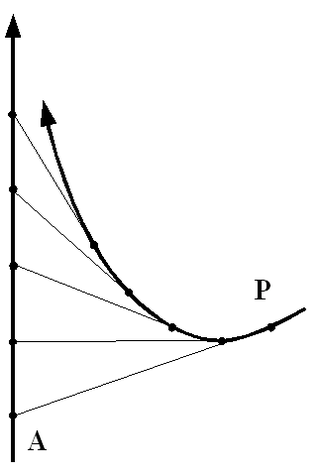Top Qs
Timeline
Chat
Perspective
Pursuit curve
Class of curves traced by a point which follows another moving point From Wikipedia, the free encyclopedia
Remove ads
In geometry, a curve of pursuit is a curve constructed by analogy to having a point or points representing pursuers and pursued; the curve of pursuit is the curve traced by the pursuers.

Definition
With the paths of the pursuer and pursued parameterized in time, the pursued is always on the pursuer's tangent. That is, given F(t), the pursuer (follower), and L(t), the pursued (leader), for every t with F′(t) ≠ 0 there is an x such that
Remove ads
History

The pursuit curve was first studied by Pierre Bouguer in 1732. In an article on navigation, Bouguer defined a curve of pursuit to explore the way in which one ship might maneuver while pursuing another.[1]
Leonardo da Vinci has occasionally been credited with first exploring curves of pursuit. However Paul J. Nahin, having traced such accounts as far back as the late 19th century, indicates that these anecdotes are unfounded.[2]
Remove ads
Single pursuer

The path followed by a single pursuer, following a pursued that moves at constant speed on a line, is a radiodrome.
It is a solution of the differential equation 1 + y′ 2 = k2 (a − x)2 y′′ 2, where k is the ratio in speed of the pursued over the pursuer. The special case with k = 1/2 is the Tschirnhausen cubic.
Multiple pursuers

Typical drawings of curves of pursuit have each point acting as both pursuer and pursued, inside a polygon, and having each pursuer pursue the adjacent point on the polygon. An example of this is the mice problem, in which pursuers on the vertices of a regular polygon chase each other along logarithmic spirals.
See also
References
External links
Wikiwand - on
Seamless Wikipedia browsing. On steroids.
Remove ads

